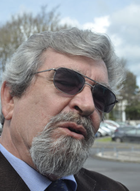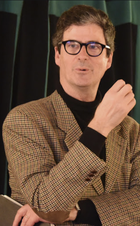In remembrance
On this page we would like to remember two Portuguese colleagues who have contributed to REFAT's activities from the beginning, but who unfortunately left us.

Alberto De Bernardi
The 14th REFAT Congress, held in Funchal (Madeira) from 17 to 19 April 2024, was sadly the last for Alberto De Bernardi, one of the network's founders and its coordinator, who passed away at the age of 75 on 26 September 2024.
In 2005, together with Luís Reis Torgal (University of Coimbra) and Maria Luiza Tucci Carneiro (University of São Paulo), De Bernardi organised an international conference at the University of Bologna, which marked the beginning of an intense collaboration between Italian, Portuguese, Brazilian, and later Spanish scholars engaged in historical research on fascist movements and dictatorial regimes of the 20th century. The long series of conferences that followed that first meeting on an almost annual basis, leading to the establishment of REFAT in 2016, always saw De Bernardi at the centre of the scene, as organiser and speaker. His personality, his booming voice, his laughter, his insights, and his sometimes controversial interventions held court at all of our network's events, right up to this last one in Madeira. It will therefore be impossible to forget him or replace him.
However, De Bernardi's leading role within REFAT, as in other areas of his professional activity, was never an end in itself. His conception of the historian's craft was always far removed from that of the intellectual who takes pleasure in his own erudition, who wants to appear more cultured and intelligent than others, who seeks to elevate himself to the status of prophet of truth. Quite the contrary. His conception of the profession of historian was centred on the idea of history as a discipline with a fundamental civic function, especially towards the younger generations: the function of providing tools for understanding the complexity of the present, projecting knowledge of the past into the future. It was this perspective that guided his frenetic activity as a scholar, always aimed at inextricably merging historical knowledge and public engagement.
To this end, De Bernardi always wanted to “build”: departments, institutes, books, manuals, magazines, series, conferences, museums, national and international networks – such as REFAT. Not all of his countless projects came to fruition, of course. But if something prevented one of them from being realised, he immediately came up with a new idea, each time involving – or perhaps “dragging along” would be the right word – colleagues and collaborators. In particular, he had a strong predisposition to work with young scholars, to involve them in multiple initiatives with the aim of transmitting to them not only the necessary scientific and methodological skills to study the past, but also the passion for life and for the world that this profession requires. Travelling with De Bernardi to Coimbra or São Paulo, Pontevedra or Rio de Janeiro, Aveiro or Porto Alegre also meant discovering places, both their history and their present, because curiosity about everything around us is an indispensable quality for historians.

Carlos Cordeiro
Born on August 22, 1946 in Ponta Delgada (São Miguel Island), Carlos Alberto da Costa Cordeiro grew up in the Azores during the Estado Novo and experienced the Colonial War in Angola. He was Professor at the University of the Azores (UA) and Integrated Researcher at the Center for Interdisciplinary Studies of the 20th Century of the University of Coimbra (CEIS20/UC). He was Director of the UA Center for International Relations and Strategy Studies and Coordinator of the respective Master in International Relations. It has always sought to promote the strengthening of cooperation ties, both inter-university and with State apparatus and with organizations of "civil societies".
He worked with contemporary history of the Azores in the contexts of Portuguese history and global history. He paid particular attention to political regimes and their respective political-administrative configurations, Azorean emigration and Azorean autonomy after the institutionalization of democracy, the Azorean press and the implications for the Azores of military conflicts that marked the 20th century. Within the scope of what REFAT is today, among other participations, he organized the Colloquium “Authoritarianism, totalitarianism and democratic responses” (Ribeira Grande, São Miguel Island, 2008) and coordinated a collective work with the same title (Coimbra, CEIS20 / UC, 2011). He passed away on September 19, 2018.

Jorge Pais de Sousa
Born in 1960, Jorge Manuel Garrido Pais de Sousa made his academic career at the Faculty of Arts of the University of Coimbra, having completed a Degree in Philosophy, a Specialization in Documentary Sciences, a Master and a PhD in Contemporary History. Librarian by profession, he was an Integrated Researcher at the Center for Interdisciplinary Studies of the 20th Century of the University of Coimbra (CEIS20/UC), as well as a postdoctoral fellow from the Foundation for Science and Technology (FCT). He taught at several Higher Education institutions, namely at the Instituto Superior Bissaya Barreto and at the Faculties of Letters and Law of the University of Coimbra.
He published a significant number of books, essays and articles, both in Portugal and abroad, in the field of institutional and political history, as well as contemporary cultural and intellectual history, with special emphasis on the works Bissaya Barreto: Ordem e Progresso (1999) and O Fascismo Catedrático de Salazar (2011). He was a member of several networks and organizations of a scientific nature, having actively participated in the process of creating REFAT. He died in Coimbra, on May 24, 2019.